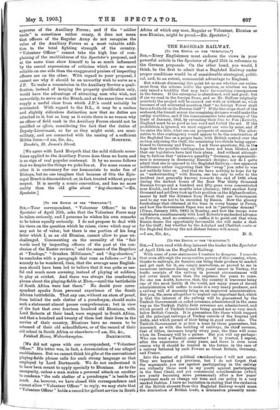THE BAGHDAD RAILWAY. [To THE Burros OP THE "SPECTATOR. "] SID,—Every
Englishman must endorse the views in your powerful article in the Spectator of April 25th in reference to the German proposals. On the other hand, you would, I think, be the first to admit that a Baghdad Railway under proper conditions would be of considerable strategical, politi- cal, and, to an extent, commercial advantage to England.
But without discussing this point let us see whether our retire- ment from the scheme settles the question, or whether we have only raised a hostility that may have far-reaching consequences in the future. If the enterprise is abandoned, well and good; but if (as we read in the foreign Press, and as Mr. Balfour originally asserted) the project will be carried out with or without us, what becomes of our reiterated assertion that "no foreign Power shall have a foothold on the Persian Gulf " ? If the lino stops short of the seaboard, the transit across the remaining distance would make the outlay worthless, and if the concessionaires take advantage of the Irade of January, 1902, by extending their line to Fou (Koweit), England must be as good as her word and forbid the act. If the prohibition is ignored, we must support our veto by arms, and if we enter the lists, what are our prospects of success? The alter- native to this contingency would appear to be the construction of the Baghdad line on a proper basis, with British control over the section adjoining the Gulf, the remaining two-thirds being appor- tioned to Germany and France. I ask these questions, Sir, in the hope that the possible contingencies have not been blinked, and that our legislators have laid their plans. And without attempt.. ing to fathom that "unknown quantity" Germany, no squeamish- ness is necessary in discussing Russia's designs ; nor do I quite admit that she is opposed to the Baghdad Railway,—her apparent indifference rather suggesting that the "swap" you refer to was not unlikely later on. And that we have nothing to hope for by an "understanding" with Russia, one has only to refer to the incident (not generally known) towards the end of 1899, when during the darkest hours of the Boer War thirty thousand Russian troops and a hundred and fifty guns were concentrated near Kushk, and four months later (January, 1900) another forty thousand and artillery took up their position on the Afghan frontier, nearer by half the distance from Herat that our Government used to say was not to be exceeded by Russia. How the gloomy forebodings that obtained at the time in every bazaar in Persia, and how the Government Paper was not in "particular demand" (Times, January 19th, 1900) in Bombay, and how the troops were withdrawn simultaneously with Lord Roberts's unchecked advance on Pretoria, need no comment,—suffice it to point out that when Russia deems the opportunity favourable she will make a dash for the Gulf ; but whether by the Askabad and Chahbah route or the Baghdad Railway the not distant future will reveal.










































 Previous page
Previous page